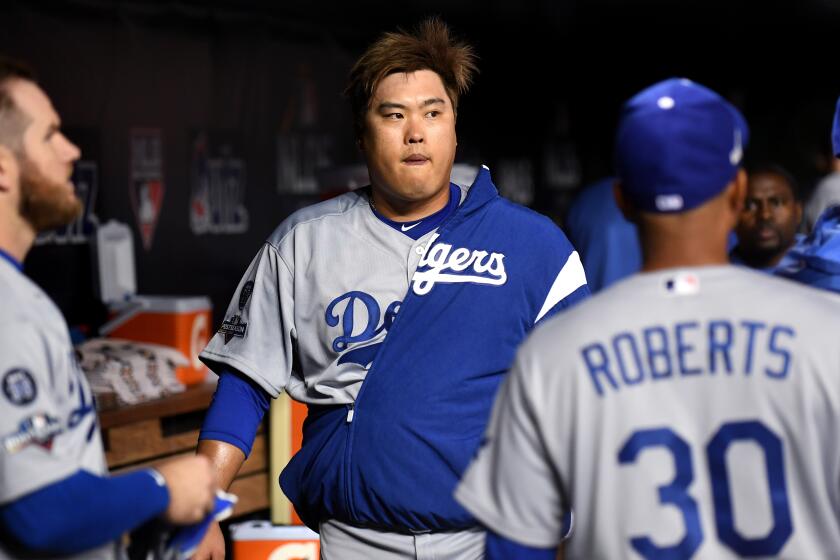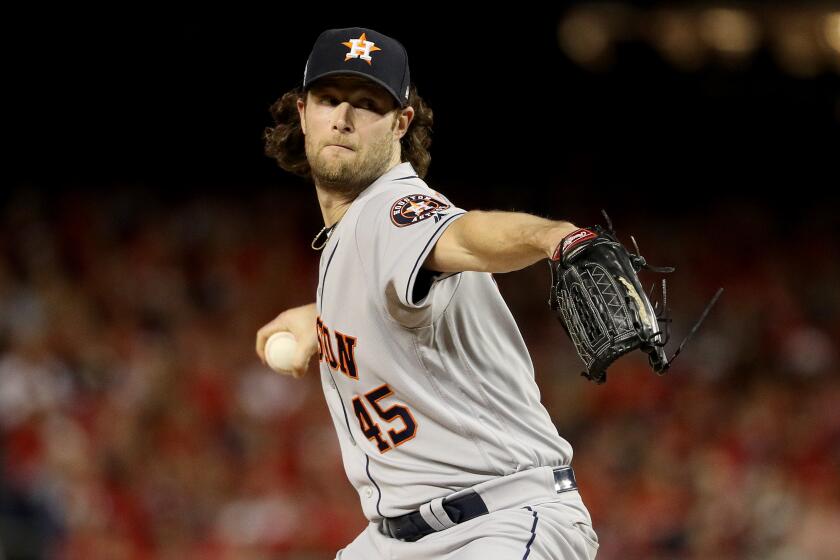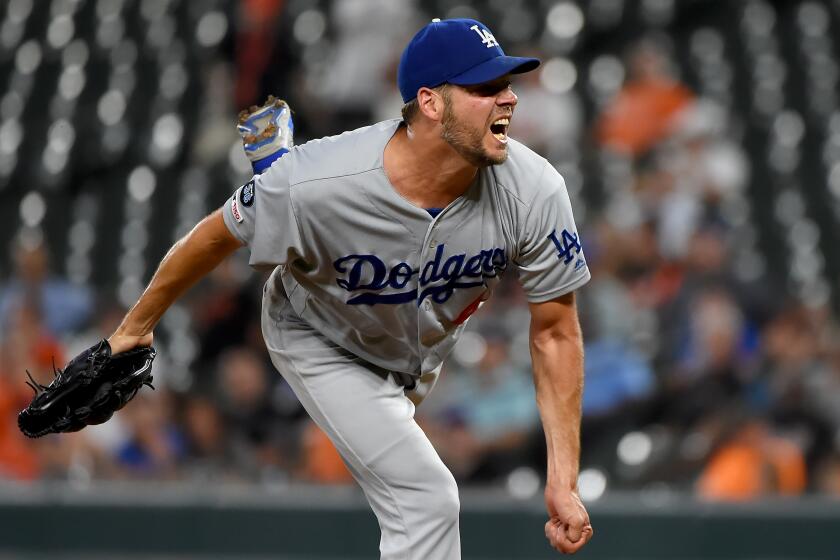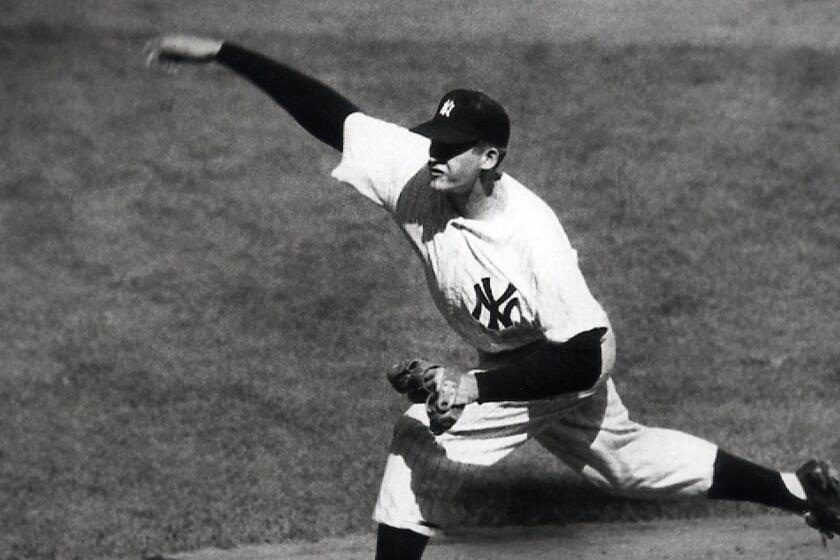Column: Dodgers brass defends lack of offseason moves amid fan frustration
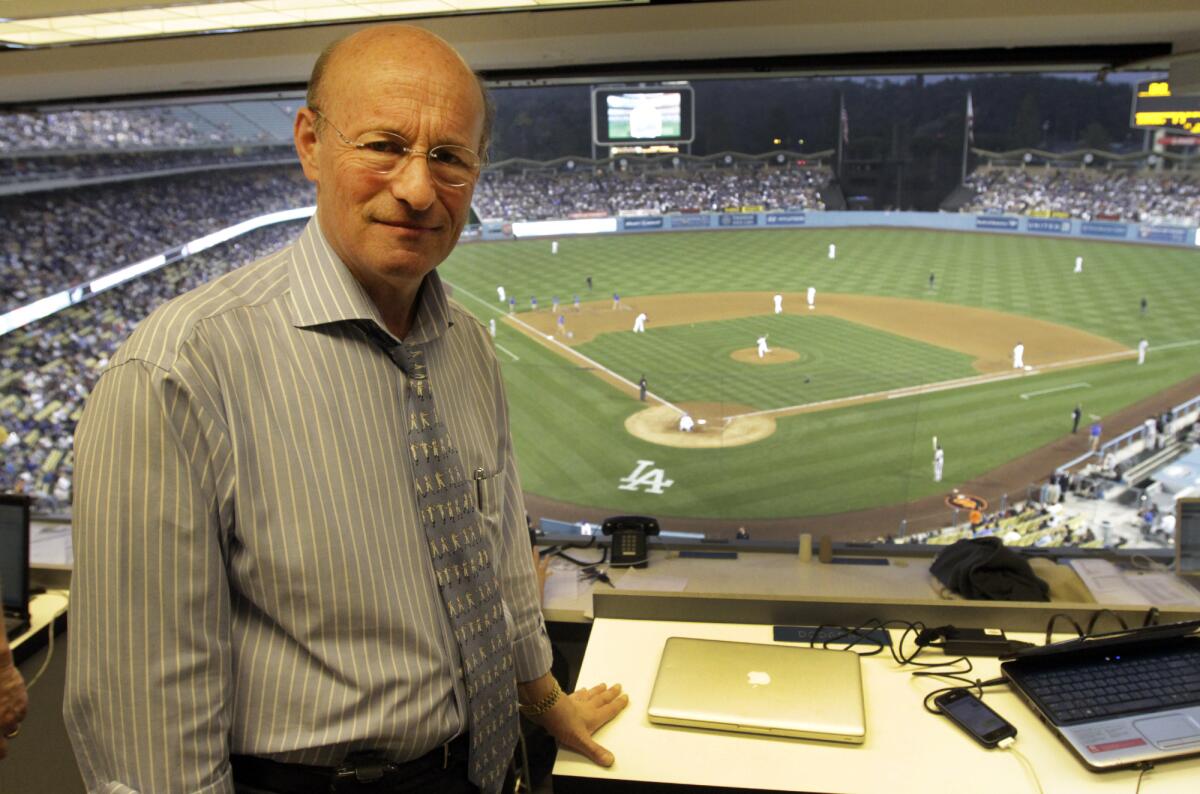
- Share via
The boos have finally gone deep.
This Dodgers fans’ annual offseason frustration, which usually swirls around the dugout of Dave Roberts or desk of Andrew Friedman, has soared beyond both this winter and landed loudly and directly in the loftiest of chairs
The blame has reached ownership. The October-worn fingers are being pointed at Guggenheim Baseball Management.
After watching the lucrative franchise again fail to spend the money to land a fate-altering free agent — this time Gerrit Cole — many fans across several platforms openly wonder how badly Mark Walter and his partners want to win a World Series.
Fans want to know why the team is not spending more of the $8.35 billion it’s getting in that botched TV contract that has resulted in the Dodgers going unseen in more than half of Los Angeles households.
The Dodgers continue to test the patience of their curiously loyal customers with a winter strategy that doesn’t mesh with winning a World Series title.
Many fans who continue to set Dodgers attendance records don’t feel like their incredible loyalty is being rewarded with a commensurate ownership commitment, and they want to know why.
So I phoned Stan Kasten and asked him.
Kasten is the Dodgers president, part-owner and Guggenheim’s on-site boss. He is the biggest hammer in the building, the loudest voice in the room, and, for better or worse, the symbol of every ownership decision.
I gave him an opportunity to address Dodgers fans’ concerns about ownership, and he emphatically embraced it.
“The L.A. Times’ characterization that everyone hates us has always been childish, superficial and wrong,” Kasten said of his ownership group.
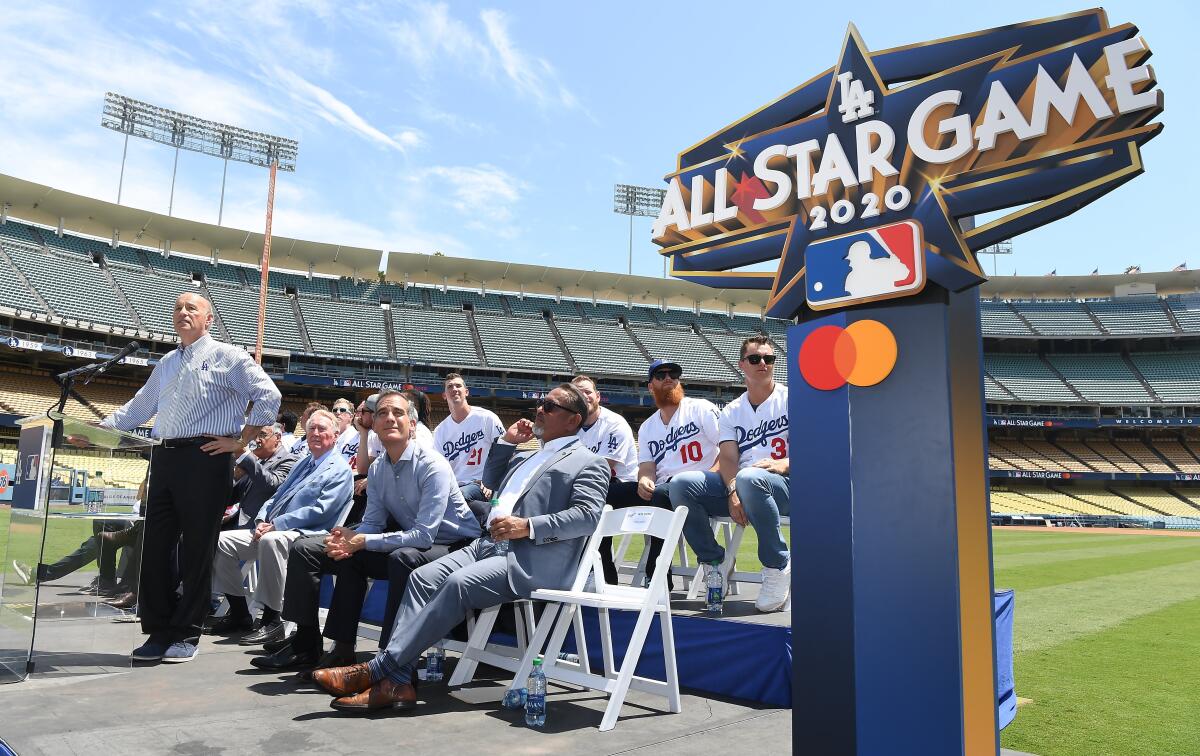
OK, so how does he define success? Does he believe seven division championships without a World Series championship is success?
“There are metrics in business that are mostly private that we look at, and I’d say we feel successful there,” he said. “But there’s no question that all of us who are competitive, from every owner that has a piece of the team to the junior people in the front office, we’re laser-focused on winning the World Series. We really, we really need that.”
But based on his offseason spending, it seems as if he’s satisfied with just winning the division every year and unwilling to write that extra check.
“Some people may think that, I think that is silly and contrary to the facts,” he said. “I think there were three teams in all of baseball that spent more than us last year ... two of them didn’t make the postseason. So, to say we don’t spend enough, it is ludicrous.
“Then you see teams with much smaller payrolls that make the postseason and even win the World Series. It’s obviously not about what you spend, it is about the moves you make, the decisions you make. I think questioning those things, criticizing those things, that’s absolutely fair. But just to say there’s a [payroll] number you need to hit and if you don’t hit it you’re not trying, that’s just silly.”
Friedman made the strong decision to sign Cole, yet was outbid by the New York Yankees. Cole later claimed he always wanted to be a Yankee, but Scott Boras’ clients generally go to the biggest spenders, so folks wonder why Guggenheim didn’t just pay for the ace.
“It is clear now, I think it was clear to us in the middle of the process, he wanted to be a Yankee, he just did,” Kasten said. “In retrospect, I think we were just the stalking horse to get a number he finally could get from a team he wanted to go to. I don’t have any quibble with his approach or with Scott’s approach, it was all very fair, but he wants to be somewhere, he got a lot of money to be where he wanted to be.”
Sports agent Scott Boras reveals why pitcher Gerrit Cole chose the New York Yankees over the Angels.
There was a Times story by Bill Shaikin last offseason that documented the club’s desire to keep the player payroll under the competitive balance tax, leading one to believe that there’s a mandate to that effect.
“No,” Kasten said. “Two years ago, it was important, even though it was never a mandate. Last year was less important. This year, there’s no real need for that.
“Last year we did reach out in a couple of respects that would have blown past the CBT, like Bryce Harper. ... Why it seems to be such a flashpoint here befuddles me. ... Obviously, the Gerrit Cole thing would have caused us to blow past it.”
Kasten added that the roster is far from finalized and, when it is, they will probably spend beyond the CBT.
“The team we have now is not going to be the team we have to start the postseason,” Kasten said. “I expect that team, this year, it looks like it’s going to be well over the CBT, or somewhat over.”
Kasten also hinted at the potential for big names to still show up.
“There are guys that we think could be difference makers and we have pursued them, we are continuing to pursue them, when there is an opportunity we will certainly jump at it,” he said. “I like stars too ... it’s cool, it’s fun, it’s fun for the team, it’s fun for the fans. But what’s most important is winning. And for the Dodgers, it’s winning year in and year out; that’s what I’m trying to build.”
A week after Hyun-Jin Ryu’s tenure with the Dodgers ended, left-hander Rich Hill agreed to a one-year contract Tuesday with the Minnesota Twins.
When he says “year in and year out,” that makes fans worry that his priority isn’t the stars who can capture October, but the consistency he nurtured while running the Atlanta Braves to 14 consecutive division titles that resulted in only one World Series championship.
“To be fair, I have been with teams in my career that went to the World Series seven times, that’s not an accident, it’s also not something I’m embarrassed by,” Kasten said. “Of the six times those teams did not win, two lost in Game 7, and two lost in Game 6. That does not suggest to me a philosophy that is … amiss and needs to be completely revamped.”
But this town is different. This market is starving. It demands a philosophy that will allow Friedman to spend whatever it takes to find the Kirk Gibson-type player who can end that 31-year drought.
“There are a lot of players who went to the World Series, weren’t successful, until the one time they finally were, it’s not a thing you can predict very easily,” Kasten said. “Last year you were all fixated on us getting Bryce Harper. ... Not one of you were screaming, ‘You’ve got to re-sign Daniel Hudson’ [Washington’s postseason closer]. Two years ago, not one of you were saying, ‘You have to go out and make a trade for Steve Pearce’ [2017 World Series most valuable player with Boston].
“I’m sorry, I just don’t agree with your thesis.”
There should not even be a debate about the cost of player acquisitions when the Dodgers are getting rich on that lousy TV deal.
“I’m not going to discuss the TV deal with you,” Kasten said. “I’m sorry ... I’m not going to do it.”
Don Larsen, who on a glorious fall afternoon in New York City in 1956 pitched the only perfect World Series game in baseball history, has died. He was 90.
But surely he knows that fans’ anger over what has essentially been an unprecedented six-year TV blackout, which Kasten blames on DirecTV, has led to the growing dislike for ownership. Surely he understands the general unrest by fans with the club’s general direction.
“You have been painting a narrative for at least six years that fans hate us and we have, year in, year out, a record numbers of fans who just disagree with you,” Kasten said. “You’re just wrong about that.”
Just because fans buy tickets doesn’t mean they’re buying the team’s vision. It appears that while they might rightfully appreciate the money ownership spent to restore Dodger Stadium, fans still don’t like what’s been done with the team.
“For sure there are some fans who that feel that way, and a lot of people in the Twitterverse feel that way,” Kasten said. “But I don’t know that you’re right about that. Based on the fans that support us ... including this coming year … incredibly strong support and ticket sales … you keep trying to convince yourself that everyone hates us. I just think you’re wrong.”
Yet, it appears something in the ownership philosophy has to change so the results on the field are ultimately different.
“We won 106 games and came a couple of outs away from beating the team that won the World Series, that doesn’t suggest to me a system that needs to be completely torn apart,” Kasten said. “What about the renewed pipeline, the old Dodger value of a player pipeline that I think we’ve had a reasonable amount of success at rebuilding? How about the kids that are homegrown Dodgers? We have a payroll of $200 million. How can you call us cheap? It blows my mind.”
Nobody believes they’re cheap, but many wonder whether they’re truly committed.
“I’ve been blessed with an amazing set of opportunities in my life,” Kasten said. “This is the best thing, the most important thing, I’ve ever done, and this is the most fun I’ve ever had, to be able to do this with this brand, this franchise, in this market, is the best thing ever.
“I couldn’t be happier to be here and more proud of what we’ve done so far, but we are far from done.”
I hope so.
More to Read
Are you a true-blue fan?
Get our Dodgers Dugout newsletter for insights, news and much more.
You may occasionally receive promotional content from the Los Angeles Times.

